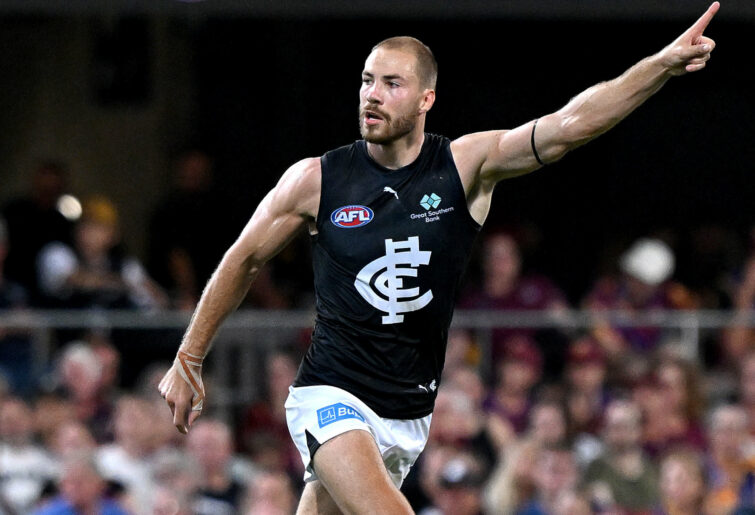Carlton’s astonishing victory over Brisbane was remarkable not only for the Blues’ extraordinary comeback but also because of an intriguing link to the past.
The opposition was the premiership favourite, and the Blues’ recent record against this talented side provided meagre cause for optimism. Moreover, the underdogs would be without their experienced full-back as well as a talented midfielder.
Pessimism was reinforced when the Blues’ opponents began with irresistible verve. Before half-time they were already more than seven goals ahead. A Carlton recovery looked inconceivable.
Injury intervened, crucially, when the frontrunners lost a star’s brilliance. Meanwhile, the Blues made a significant change at half-time, replacing a seasoned utility with a little-known 21-year-old who had been striving for years to establish himself in the big time.
The Blues’ blitz at the start of the third quarter was electrifying, but after catching up in stunning style they couldn’t build a lead. The scores remained absorbingly close until the thrilling climax, when Carlton’s well-known full-forward sealed the win with his left foot.
A remarkable sequence of events, to be sure. Even more striking, though, is that the above scenario exactly describes not only Carlton’s win over Brisbane this year, but also the most famous game ever played — yes, the 1970 grand final.
Carlton went into the decider 53-and-a-half years ago as the pronounced underdogs, and no wonder; Collingwood had defeated the Blues in all three of their clashes that season, including a thrashing by 77 points shortly before the finals.
The dominance of glamour full-forward Peter McKenna had prompted the Blues to find an alternative to their experienced full-back Wes Lofts, and their admired wingman Bryan Quirk was out injured.
The Pies started the Grand Final with the vibrant mastery that Brisbane displayed in the first third of their recent match against Carlton. McKenna was again ascendant with no fewer than five goals in the first half, but the Magpies’ legendary hardman Des Tuddenham ran into him and concussed him. Tuddenham claimed afterwards he was trying to take out Kevin Hall (who had replaced Lofts as McKenna’s opponent) but misfired.
Still, the Blues fans were blue indeed when Hall and his teammates trudged off at half-time 44 points behind. Their prospects seemed so bleak that the desperate decision was taken — a big risk in the era of only two non-interchange bench players — to replace Bert Thornley, although he was uninjured, with the unheralded Ted Hopkins, who had rarely managed to win selection in Carlton’s starting line-up since being recruited as a midfielder three years earlier.
Hopkins’ conspicuous role in Carlton’s 1970 revival made him famous. His equivalent against Brisbane, Jack Carroll, also 21 and recruited as a midfielder three years earlier, did not kick four goals in the second half like Hopkins; however, as his captain underlined after the game, Carroll made an important contribution, including a vital goal — the Blues could not have won without it.
Harry McKay celebrates the winning goal in Carlton’s one-point win over Brisbane. (Photo by Bradley Kanaris/Getty Images)
His goal was Carlton’s fifth in the avalanche straight after the long break when the Blues piled on six goals in ten minutes to hit the front. It was almost identical to the spectacular comeback at the start of the third quarter in 1970, when Carlton scored seven goals in 13 minutes, including three from Hopkins, to cut the margin to four points.
In both matches, however, Carlton was unable to convert its intimidating momentum into a decisive lead. Tension remained extreme throughout the last quarter of these gripping encounters more than half a century apart.
The final goal in both games came from the left boot of Carlton’s full-forward, though in very different fashion, with Harry McKay’s crucial set shot contrasting with Alex Jesaulenko’s snap on his non-preferred that bounced its way through and caused such excitement that the MCG itself seemed to tremble.
Carlton fans have high hopes for the 2024 season. Defeating the premiership favourites at the outset in startling fashion, emulating the Blues’ most famous victory of all in the process, will naturally be seen as an auspicious omen.
